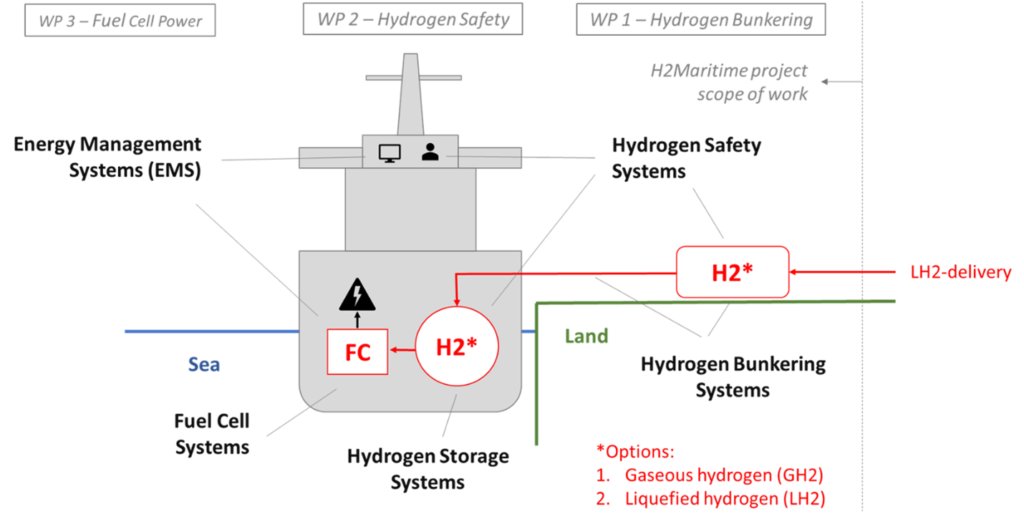H2MARITIME
A significant reduction of the emissions in the maritime sector can be achieved by introducing alternative and environmentally friendly fuels. Hydrogen produced with zero emissions can be an alternative solution for several maritime applications. The H2Maritime-project has focused on research and development of competence, methods, and technology for the use of hydrogen and fuel cells in the maritime. The project three consisted of research partners (IFE, NTNU, and USN, five industry partners (Equinor, ABB, Umoe Advanced Composites, HAV Hydrogen, and Vysus Group), and one public organization (Norwegian Maritime Authority). The H2Maritime-project was organized in three main research areas (work packages).

1. Hydrogen Bunkering and Storage
The focus in this research area was on the supply of liquid hydrogen (LH2) from a bunkering place on land to a vessel, either directly as low-pressure liquid hydrogen or indirectly as high-pressure gaseous hydrogen (GH2). The primary objective with this activity (WP1) was to develop new designs and operation strategies for efficient and safe hydrogen refueling and bunkering systems for maritime applications. A set of 2D, 1D, and non-dimensional (0D) tools for modeling of fast filling of pressurized hydrogen gas was developed (Kesana et al. 2023; Helgsen, 2023). The research activity on hydrogen bunkering systems continues at IFE in the Rail4EARTH project.
2. Hydrogen Safety
Safety strategies must be implemented to ensure safe operation during refueling and bunkering of hydrogen. Depressurization of gas during emergency situations, for example, must ensure the lowest risk possible. Specific codes and standards for hydrogen refueling and storage only cover small systems for hydrogen vehicles. The primary objective with this activity (WP2) was to provide recommendations on how to design safe GH2 and LH2 refueling/bunkering and storage systems. A LH2 safety analysis of hydrogen powered maritime vessels (Balestra et al., 2021) and a detailed study on the safety in human operation during bunkering of liquid hydrogen was performed (Lunde-Hanssen and Ulleberg, 2023).
3. Fuel Cells Systems
The focus in H2Maritime was on large low-temperature fuel cell (FC) systems for ships. There does not exist standard maritime FC systems, nor any guidelines for design and operation of hybrid FC systems for maritime applications. There is also a lack of knowledge on how to optimize the energy management systems (EMS) and FC system controls with respect to fuel cell lifetime. The primary objective with this activity (WP3) was to build in-depth knowledge on how to design and operate 1-10 MW maritime hybrid FC power systems. A PhD-study on the design of hybrid fuel cell/battery systems for maritime vessels was completed at NTNU with co-supervision from IFE (Balestra, 2023). The PEMFC System Laboratory at IFE was also used in this part of the project. The research activity on fuel cell systems continues in the MoZEES and HYDROGENi projects.
Selected Publications
Balestra, L., Schjølberg, I. (2021), Modelling and simulation of a zero-emission hybrid power plant for a domestic ferry, International Journal of Hydrogen Energy, 46 (18), 10924-10938, 10.1016/j.ijhydene.2020.12.187
Balestra, L., Schjølberg, I. (2021) Energy management strategies for a zero-emission hybrid domestic ferry, International Journal of Hydrogen Energy, 46 (77), 38490-38503, 10.1016/j.ijhydene.2021.09.091
Balestra L., Yang R., Schjølberg I., Utne I., Ulleberg Ø. (2021) Towards Safety Barrier Analysis of Hydrogen Powered Maritime Vessels, International Conference on Ocean, Offshore, and Arctic Engineering (OMAE), in ASME Transactions, https://doi.org/10.1115/OMAE2021-60451
Balestra L. (2022) Design of Hybrid Fuel Cell/Battery Systems for Maritime Vessels, PhD thesis, NTNU, https://doi.org/10.1115/OMAE2020-18093020
Helgesen G. (2023) Heat exchangers for hydrogen tank filling, Report IFE/E-2023/002
Kesana N., Welahettige P., Hansen P.M., Ulleberg Ø, Vågsæther K. (2023) Modelling of Fast Fueling of Pressurized Hydrogen Tanks for Maritime Applications, International Journal of Hydrogen Energy (Approved for publication in April 2023)
Lunde-Hanssen L.S., Ulleberg Ø. (2023) H2 Safety in Human Operations, Report IFE/E-2023/004

